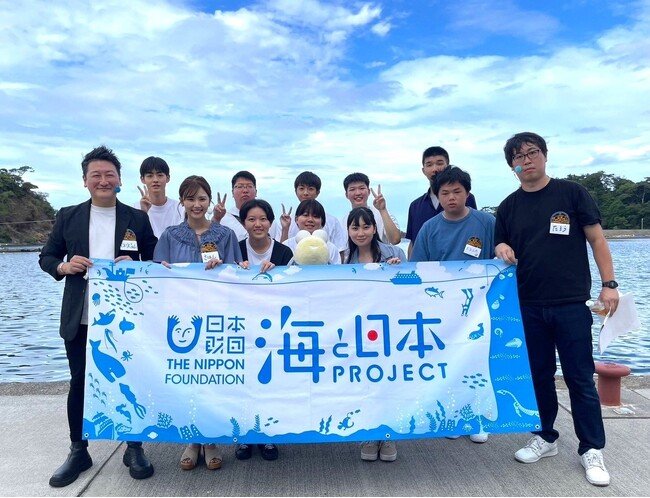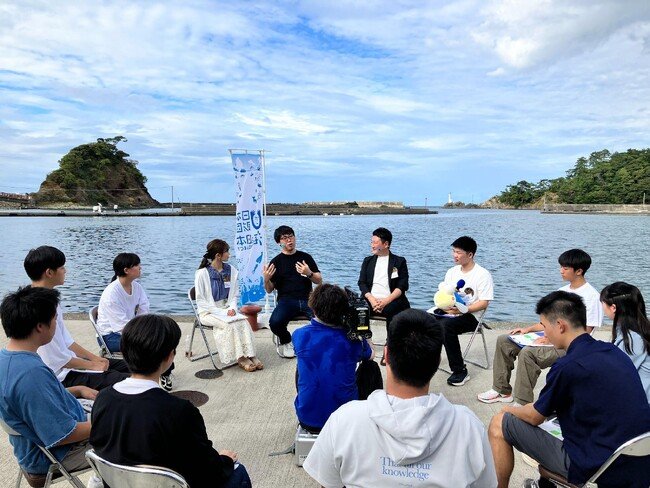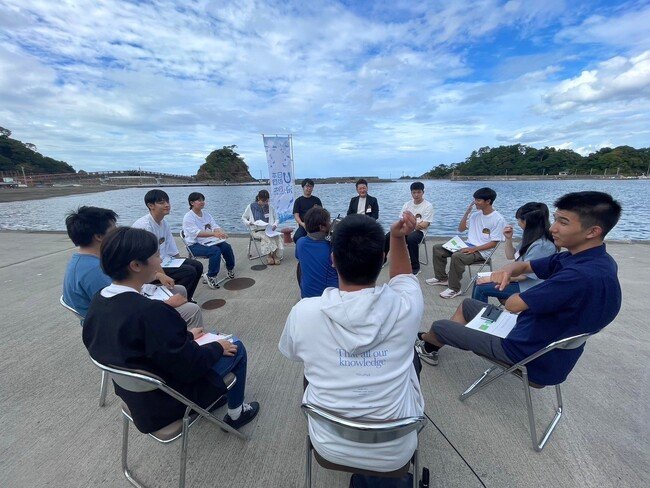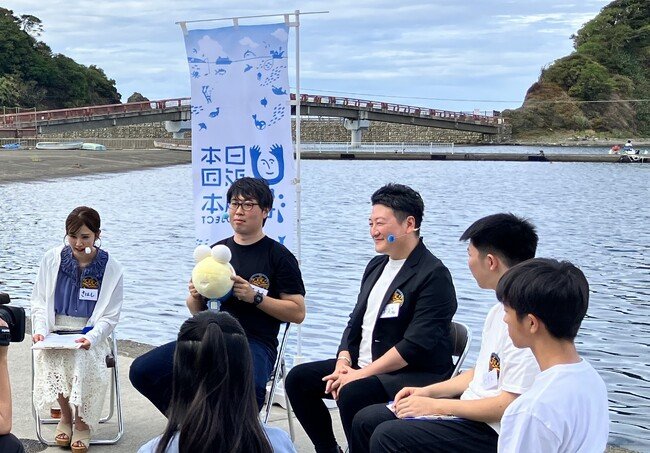Sea and Japan Project Public Relations Office
Jun Hori and high school students thought through the future of the sea at the sea and philosophy school “Zawazawa High School – Philosophy that will change the future of the sea – #3”!
Sunday, September 15, 2024 [Location] Wakasa Takahama Fisheries Cooperative Association, Takahama Town, Oi District, Fukui Prefecture, etc.
……
On Sunday, September 15th, Fukui Environmental Research and
Development held the third session of “Zawazawa High School: Philosophy that will change the future of the ocean.” With the aim of “sustainable use and conservation of the ocean,” Zawazawa High School has high school students learn about the current situation and barriers from people who have ocean issues and dilemmas, and use philosophical thinking to improve society from the essence of things. This is a marine education program that gives you the power to come up with solutions to problems. Since June, we have opened a total of 6 times in Takahama Town, Oi District, Fukui Prefecture, a town that walks with the sea. This event is part of the Nippon Foundation’s “Ocean and Japan Project,” which connects people through the ocean in order to pass on the rich and beautiful ocean to the next generation.

Event overview
・Event overview: Zawazawa High School ~Philosophy that changes the future of the sea~#3
・Date: Sunday, September 15, 2024
・Venue: Takahama Town, Oi District, Fukui Prefecture, Wakasa Takahama Fisheries Cooperative Association, etc.
・Participants: 9 high school students from Fukui prefecture, both male and female, Jun Hori (journalist/former NHK announcer), Shotaro Iwanai (associate professor at Toyohashi University of Technology)
・Program: “Zawazawa High School – Philosophy that will change the future of the sea – #3″
〇Broadcast: Fukui TV (scheduled for October 26th (Saturday) 16:00-16:30) 〇 Distribution TVer (October 26th (Sat) 17:00~) / YouTube (Fukui TV Channel – YouTube)
So far, we have approached the true state of the city that walks with the sea. Now on to the philosophy part.
This year’s stage is Takahama Town, Fukui Prefecture, which walks with the sea. It is a town on the western edge of Fukui Prefecture that is thriving with fishing and tourism that takes advantage of the sea. In the two lectures so far, we have asked people from Takahama Town and fishermen about what makes Takahama Town unique, and we have focused on the local resources of nature, history, culture, and people who live there, and we have been promoting regional development by utilizing them. Using the method of “local studies,” we delve into the current state of Takahama Town, which is living with the sea. This time, we finally get to the philosophy part. We welcomed Mr. Shotaro Iwanai, a philosophy expert, to translate into words what the high school students have learned about what they have learned about the current “city that walks with the sea,” and to “ask questions” that will lead to output. It will be times.

“Philosophical dialogue” and “question-asking” where people exchange opinions about their past experiences in their own words. First, we held a “Philosophy Dialogue” (PforC) in which high school students exchanged their opinions.
Professor Iwanuchi gave advice on how to think during the
“Philosophical Dialogue.” “1. Don’t rush the answer. 2. It’s okay if you don’t understand. 3. It’s okay to remain silent.” The high school students expressed their opinions in their own words about Takahama, the sea, and their own thoughts related to those things. From there, we looked for questions that we could relate to based on the reality of high school students. “Why do people try to protect the sea? How do the great qualities of Takahama connect to the sea?” “What is the essence of throwing away the old in favor of the new?” “Is there a difference between a city where you want to live and a city where you want to sightsee?” “Why do people love?” In particular, the question “Why do people try to protect the ocean?” focuses on who is destroying the ocean system, and there are opinions that humans are destroying it, as well as opinions that the ocean is destroying humans in order to protect itself. Are you currently experiencing various problems as you try to eliminate them? And so on.
The next session will be held in October, and we will further deepen the “essence” of the questions posed in the third session.

Comments from class president Jun Hori and philosophy lecturer Professor Iwanai. Jun Hori, the class president, said, “The work I do as a journalist is a process of forming a hypothesis from a place where there is no question to begin with, searching for facts through interviews, forming another hypothesis, and repeating it. I realized once again that power is important.” In addition, lecturer Professor Iwanai said, “I think it’s great that you were able to align your own opinion with the other person’s opinion and expand on it.It’s okay to have different opinions.It’s important to create a place where you can discuss things that include that.” “This is a shortcut to getting closer to the essence of changing society,” he said, expressing his expectations for the next time.

Voices from participants
Participating high school students said, “I felt like I didn’t have to understand the rules of philosophy dialogue, I didn’t have to be silent, and it gave me more room to think, which is the complete opposite of what I do at school.” “I felt like I had more room to think about ideas that I wouldn’t have thought of myself.” I received comments such as ”
-Organization overview-
Organization name: Fukui Environmental Research and Development General Incorporated Association
URL: https://fukui.uminohi.jp/
Activities: Fukui Prefecture’s diverse seascape, with the Echizen Coast to the north featuring the strangely shaped cliffs seen at Tojinbo, and the graceful ria-style coast of Wakasa Bay to the south, has flourished since ancient times as a key hub for maritime transportation such as Kitamaebune. . The coast of Fukui Prefecture, where cold and warm currents meet, is a treasure trove of seafood such as Echizen crab and Wakasa flounder. Fukui Environmental Research and Development (a company) is promoting a campaign to foster a sense of familiarity and appreciation for the ocean.

Nippon Foundation “Ocean and Japan Project”
The sea supports Japanese people’s lives in various ways, sometimes giving them peace of mind, excitement, and inspiration. This is an all-Japan project that aims to encourage people across the country, including children, to view the ongoing environmental deterioration of the oceans as their own, and to expand the circle of action to preserve the oceans for future generations. is.
https://uminohi.jp/
